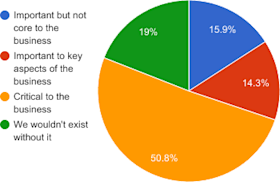
Summary
After presenting at the recent CIOArena conference in Atlanta, Kentik VP of Strategic Alliances Jim Frey came away with a number of insights about the adoption of digital business operations in the enterprise. In his first in a series of related posts, Jim looks at audience survey responses indicating how reliant enterprises — even those that aren’t digital natives or located in tech industry hotspots — have become on the Internet for core elements of their business.
Digital Business Transformation Makes the Network Indispensable

CIOArena conferences offer C-level, executive, and senior IT leaders from mid- to large-sized enterprises a chance to network, look at key trends, and learn about cutting-edge solutions like Kentik Detect. Kentik participated in the March CIOArena event in Atlanta, which enabled us to share perspectives with other participants and to learn how they view modern network visibility as their approach to digital business operations matures. I’ll be writing a series of posts capturing some key observations from our time at the conference, but here’s one of our main take-aways from this event: while enterprises are increasingly focused on digital business they are still maturing in their approach to understanding and managing the key dependencies, network and beyond, of their digital business applications.
I led off Kentik’s participation in the conference by giving a presentation entitled “The Network Doesn’t Just Run the Business, It Sees the Business.” I’ll cover that presentation in more depth in a future post, but you can [view the slides here](https://info.kentik.com/rs/869-PAD-887/images/JFrey Kentik CIOarena 8Mar17.pdf). The main point I made that’s relevant to this blog post is that the Internet is a critical piece of the delivery path for digital business. As such, the network is literally running the business, carrying the revenue. That also means that the network is more than a utility, it’s a key source for operational and business intelligence, because it’s in a unique position to see both the activity and performance of digital business.
Digital Business Brings Internet Reliance
While it might seem obvious by now, pretty much every business of any appreciable size today sees the Internet as important. But just how important? One of the survey questions we ran at the conference asked “How important is the Internet to your business?” The point of this survey question was to separate businesses into distinct segments based on their reliance or focus on digital business. Here are the results of that survey question:

In addition to those shown in the graph there was also a fifth choice: “The Internet has no importance to my business.” But nobody chose that response. Not a huge surprise — businesses that have zero dependence on the Internet are not likely to show up at a CIO conference in the first place — but if you think about it, nearly every business today has, at the very least, an email address and a website.
At the low end of the Internet-dependence spectrum was the roughly 16% of respondents who see the Internet as important but not core to the business. I interpret this as meaning that they aren’t critically dependent on the Internet in terms of what they make or deliver as services, how they go to market, and how they carry out key business processes. These businesses communicate externally via email, perform some social media marketing, utilize some productivity apps, perhaps even host non-essential but useful IT functions in the cloud or utilize SaaS. But if their Internet connectivity went down or was severely disrupted, no critical aspect of the business would stop working. “Internet down? Bummer. Can’t get all my work done today. Oh well, there’s always tomorrow.”
Near in spirit to those respondents were just over 14% that see the Internet as “important to key aspects of the business.” To me, this indicates that some portion of the business relies heavily on either cloud or SaaS resources, that their go-to-market involves digital resources or programs, or that their website or a mobile app is a major customer interface for information, though not for revenue or transactions. There would be real pain if those resources or go-to-market mechanisms were disrupted, but no existential threat to the business. “Internet down? Not good. We need to get this fixed soon or we’re going to feel it on the bottom line.”
A majority now sees the Internet as critical to their business.
Most fascinating to me though, was the fact that a majority of those surveyed see the Internet as “critical” to the business. To me, this means that revenue is at stake in some fashion, that a major disruption to cloud resources or Internet-accessible users, customers, and markets would be a board-level event. Heads may very well roll if the disruption is significant enough. “Internet down? Ouch! We need to fix this immediately, and then plan to prevent this in the future.”
On the far end from “no importance” were 19% of surveyed attendees that hail from digital-native organizations. These include Web companies that rely exclusively on the Internet to reach and transact with their customers, as well as service providers for whom Internet traffic *is* the business. It’s certainly interesting that nearly a fifth of the represented businesses in the Atlanta metro are essentially Internet-based. “Internet down? Crisis! How could we possibly let this happen in the first place?!?”
Digital Business is Everywhere
While Atlanta is a major metropolitan area, it’s not Silicon Valley. But if over 70% of business respondents represented at a CIO-ish conference see the Internet as revenue-critical or they couldn’t imagine their business without it, I think we can safely conclude that digital business is nearly everywhere. In further blogs, we’ll look to the responses from these surveyed businesses for further insights into the rapidly evolving story of digital business transformation. In particular we’ll cover two additional survey questions that we asked, which focused on application architectures and hosting deployment models as well as the maturity of the respondents’ approach to network management.
For the 70% that sees digital business operations and internet traffic flow as crucial to their business, it follows that network traffic intelligence is mission-critical. If you’re using legacy tools that were architected in the pre-cloud era, it’s high time to protect your services and revenue by upgrading to a modern solution. Check out the Kentik Platform and learn how big data can power both operational and business insights. If you already know that you’re ready for big data-powered network visibility, you can sign up for a free trial today.
